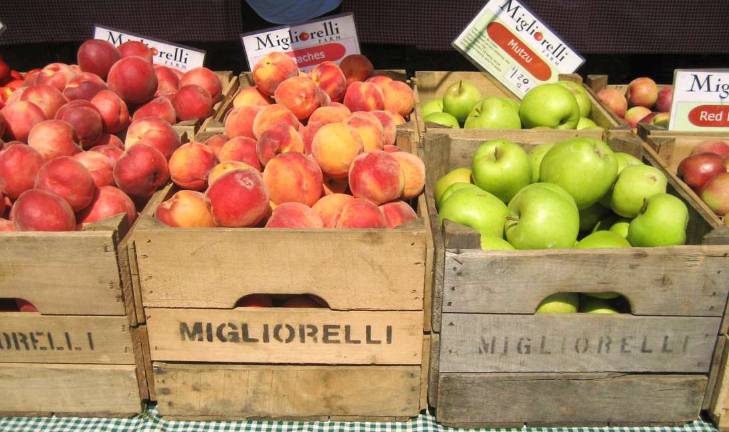Organic v. local

Buy organic and youre (probably) not dealing with chemical residues. Buy local and you get fresher food and keep your farmer in business. But what to do when you have to choose one over the other?
Organic Buying organic doesnt necessarily mean buying certified organic. With locally grown produce, if youre comfortable with the farmer and you know hes not using pesticides, buying from him is preferable to trucking something thats been picked across the country. Youre supporting the local economy, the food is fresher so antioxidant and nutritional levels are higher, and there are no toxic residues. Buying from a local certified organic farm is better still, because it gives you confidence that someones checking the farmers books. But if youre buying from a farm thats not certified organic and you dont know the farmer, its buyer beware.
When consuming conventionally grown produce, it doesnt matter if its grown locally or not; youre still dealing with the potential of toxic pesticides. Food has to be nourishing and free of manmade chemical poisons, otherwise its a delivery system for something thats going to have an aberrant effect on your health.
These chemical agents can disrupt hormone balance, inhibit digestive function, greatly add to body burden, and increase body toxicity. These chemicals may adversely affect the nervous system and contribute to abnormal cell growth.
Were dealing with a chemical cocktail right now, particularly when it comes to dirty foods like blueberries and red peppers. We do not know the full extent of the potential damage caused by even one chemical pesticide on human biology, never mind the chemical cocktail used today.
The human body is always in a state of change. Cells are living and dying constantly, being monitored by complex processes, and now were ingesting poundages of chemical toxins that are pressuring the cells into aberration. Thats unnecessary. If you can avoid those toxins and take that pressure off of your system and all its trillions of cells, youre going to be healthier.
If you are eating non-organic food, consider using herbal material to amplify detoxification enzymes in the body. One of the great herbs is turmeric, whose resins help the liver get rid of poisons. Ginger, spice herbs, and cruciferous vegetables like broccoli also help detoxification.
As Hippocrates, father of western medicine, instructed: Let food be your medicine, medicine be your food, and do no harm.
John Malatras owns Harvest Moon Health & Nutrition in West Milford
- As told to Becca Tucker Local
Organic or local? I always ask, cant we have it both ways? But okay, in the case that you cant, which should you buy? I say local.
Say you go to a farm thats local but not organic. You know the farmer, you know the place, and you know what methods theyre using. There are all sorts of reasons why thats desirable even though its not organic. Youre looking at the person selling it to you; hes part of your community.
Now heres this thing called organic, it came from Chile or China. Even at a grocery store like Whole Foods, youre going to see a whole lot of produce that comes from very far away. They advertise a lot about how much they get local produce. Im in one of those pictures at the Whole Foods store because theyre selling my stuff, but the stuff on the other side of the aisle is from Chile.
Who the heck knows what those people are doing? I wouldnt eat any produce grown in China because you read so much about how they cheat and use chemicals they shouldnt use and all that. Thats an additional factor, when it comes from another country.
But say it comes from California and its really organic. Its definitely a good thing that big huge farms in California are going organic. But I would still rather go to the farmers market right down the road and buy non-organic produce from the farmer.
Here in Pennsylvania, I cant get organic apples except from one guy, and theyre not very good. I could get organic apples from Washington State; I cant get them from Pennsylvania though. But there are a lot of people here who grow really great apples that are not organic. I buy a lot of apples from those guys, and bring them to farmers markets to sell. I know them, I know their families, Ive been in their house, I dont believe they would do anything dishonest. When theyre using pesticides, theyre doing it all legally. They wouldnt take a chance on my health.
I can give you these apples from down the road that are cheaper and way better than organic apples from Washington State, but a lot of people will say theyre not touching my apples because theyre not organic. They want to know every single thing is certified organic. I kind of understand that attitude, but its just not that simple. They dont want to have to think about it.
Jim Crawford owns New Morning Farm, a 95-acre organic farm in south-central Pennsylvania. He is president of the board of the Tuscarora Organic Growers
- As told to Becca Tucker